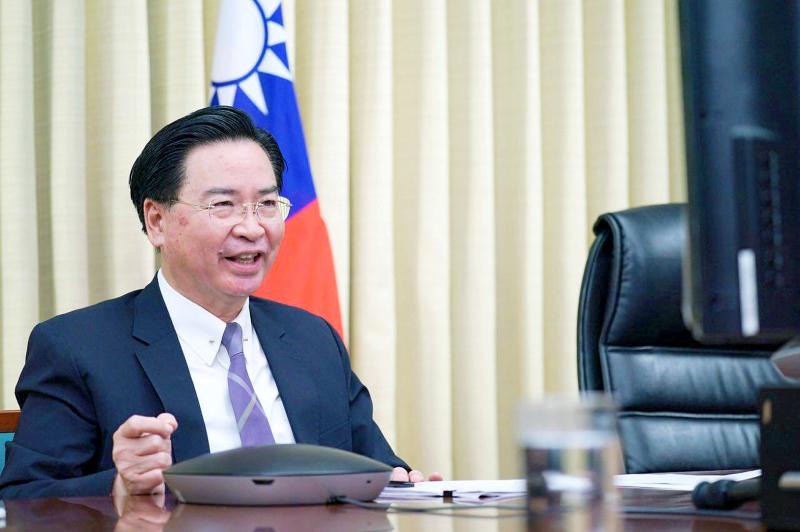Taiwan could play a significant part in a global restructuring of production lines and the supply chain of critical materials in the post-COVID-19 era, Minister of Foreign Affairs Joseph Wu (吳釗燮) said on Tuesday during a virtual discussion held by Washington-based think tank the German Marshall Fund of the United States (GMF).
A restructuring of the supply chain is being discussed all around the world, Wu said.
Critical materials supplied by Taiwan seem to be helping the international community, he added.

Photo courtesy of the Ministry of Foreign Affairs
Playing a significant part in a restructuring of the supply chain of critical materials would be a “very good role for Taiwan,” Wu said.
“I think there are already very good friends either from the United States or from Europe ... saying that they are looking at Taiwan as a natural partner in this type of restructuring,” he said. “We’ll be very happy to participate in this regard.”
The hour-long discussion, titled “The Post-Pandemic Order: Navigating Approaches to China,” was part of the GMF’s Brussels Forum and moderated by GMF senior visiting fellow Noah Barkin.
US senators Marsha Blackburn and Chris Coons, and European Parliament member Reinhard Butikofer were among the speakers who participated in the discussion.
Wu also spoke about the pressure Taiwan has faced from China.
“If you look at the situation in this part of the world, Taiwan is not the only country that is suffering from Chinese pressure,” Wu said, giving as examples a border conflict between China and India, a territorial dispute between Japan and China in the East China Sea, and the expected passage of national security legislation in Hong Kong.
“For Taiwan, we have been dealing with the pressure coming from China for years and years ... but in the period of the pandemic, we are feeling more heat from China — from a more assertive China — than ever,” he said.
While Taiwan has been dealing with military and diplomatic pressure from China for years, Wu said that it has gotten worse in the past few months.
“I think that we are seeing two competing paradigms in dealing with COVID-19,” he said. “On the one hand is democracy and transparency; on the other is authoritarianism.”
Wu said that he believes this competition extends beyond the handling of the pandemic.
“There are also two philosophies, two ways of life,” he said. “I think Taiwan is very clear: We are standing on the side of democracy.”
Taiwan feels Chinese pressure “more than any other country,” he said.
“If we stand strong, I’m sure all other democracies will feel that they have a hope in dealing with China as well,” he added.

NATIONAL SECURITY THREAT: An official said that Guan Guan’s comments had gone beyond the threshold of free speech, as she advocated for the destruction of the ROC China-born media influencer Guan Guan’s (關關) residency permit has been revoked for repeatedly posting pro-China content that threatens national security, the National Immigration Agency said yesterday. Guan Guan has said many controversial things in her videos posted to Douyin (抖音), including “the red flag will soon be painted all over Taiwan” and “Taiwan is an inseparable part of China,” while expressing hope for expedited “reunification.” The agency received multiple reports alleging that Guan Guan had advocated for armed reunification last year. After investigating, the agency last month issued a notice requiring her to appear and account for her actions. Guan Guan appeared as required,

A Vietnamese migrant worker yesterday won NT$12 million (US$379,627) on a Lunar New Year scratch card in Kaohsiung as part of Taiwan Lottery Co’s (台灣彩券) “NT$12 Million Grand Fortune” (1200萬大吉利) game. The man was the first top-prize winner of the new game launched on Jan. 6 to mark the Lunar New Year. Three Vietnamese migrant workers visited a Taiwan Lottery shop on Xinyue Street in Kaohsiung’s Gangshan District (崗山), a store representative said. The player bought multiple tickets and, after winning nothing, held the final lottery ticket in one hand and rubbed the store’s statue of the Maitreya Buddha’s belly with the other,

‘NATO-PLUS’: ‘Our strategic partners in the Indo-Pacific are facing increasing aggression by the Chinese Communist Party,’ US Representative Rob Wittman said The US House of Representatives on Monday released its version of the Consolidated Appropriations Act, which includes US$1.15 billion to support security cooperation with Taiwan. The omnibus act, covering US$1.2 trillion of spending, allocates US$1 billion for the Taiwan Security Cooperation Initiative, as well as US$150 million for the replacement of defense articles and reimbursement of defense services provided to Taiwan. The fund allocations were based on the US National Defense Authorization Act for fiscal 2026 that was passed by the US Congress last month and authorized up to US$1 billion to the US Defense Security Cooperation Agency in support of the

CLASSIFIED BRIEFING: The ministry said the special budget focuses on building a comprehensive defense system and strengthening the domestic defense industry The Ministry of National Defense yesterday released information on seven categories of weapons systems to be procured under a stalled NT$1.25 trillion (US$39.57 billion) special defense budget, including precision artillery, long-range missiles, air defense anti-tank missiles and more than 200,000 uncrewed aerial vehicles (UAVs). The Executive Yuan approved a draft version of the budget on Nov. 27 last year and submitted it to the legislature for review. The legislature’s Foreign Affairs and National Defense Committee yesterday invited Minister of National Defense Wellington Koo (顧立雄) to deliver a classified briefing and answer questions at a closed-door session. Koo said he hoped to provide lawmakers